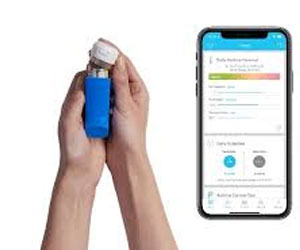- Home
- Editorial
- News
- Practice Guidelines
- Anesthesiology Guidelines
- Cancer Guidelines
- Cardiac Sciences Guidelines
- Critical Care Guidelines
- Dentistry Guidelines
- Dermatology Guidelines
- Diabetes and Endo Guidelines
- Diagnostics Guidelines
- ENT Guidelines
- Featured Practice Guidelines
- Gastroenterology Guidelines
- Geriatrics Guidelines
- Medicine Guidelines
- Nephrology Guidelines
- Neurosciences Guidelines
- Obs and Gynae Guidelines
- Ophthalmology Guidelines
- Orthopaedics Guidelines
- Paediatrics Guidelines
- Psychiatry Guidelines
- Pulmonology Guidelines
- Radiology Guidelines
- Surgery Guidelines
- Urology Guidelines
84% of people with asthma use inhalers incorrectly, study finds

84% of people with asthma use inhalers incorrectly. A new study finds that vast majority of people with asthma may be using their inhalers incorrectly, potentially making their medicine less effective and improper control of their risk of asthma attacks.The new research has been published in The Journal of Allergy and Clinical Immunology: In practice.
Many asthma medicines require that patients take two "puffs" of their inhaler to receive the prescribed dose. Asthma guidelines and patient instructions for inhaled medications recommend that patients exhale completely prior to inhaling, inhale the medication slowly and deeply, hold their breath for up to 10 seconds and then wait prior to their next inhalation. These several steps should take between 30 and 60 seconds.
These steps allow the medication to reach the appropriate parts of the respiratory tract and maximize effectiveness, helping patients to decrease symptoms, increase their level of asthma control and avoid hospitalization.
Data from 7,558 patients, collected by Propeller Health's digital medicine, showed that the majority of patients (84%) took less than 30 seconds between the first and second puff of their rescue or controller inhaler. Further, 67% waited less than 15 seconds between inhalations. Only 16% of patients waited more than 30 seconds between puffs, the minimum amount of time necessary to complete the recommended steps.
Previous research on inhaler technique was confined to a clinical setting, where a provider would ask a patient to demonstrate their technique for research purposes. Now, data from digital medicines can observe how patients use their inhalers in a real-life setting.
"Doctors have known for years that many patients do not follow the recommended inhaler instructions. This is the first time we've had objective data from digital medicines to observe it outside of the clinic," said David Stempel, MD, Propeller's SVP of Medical and Clinical Affairs.
"Digital medicines have the potential to not only assess inhaler technique in real-time but also notify a patient when they're not using the inhaler properly and provide education and sources for training, which goes beyond what a clinician can do for the patient day-to-day."
Of the patients studied, 4-11-year-old patients had the highest level of acceptable timing between inhaler use, while those 18-29 years had the lowest.
"We hope that with this data from digital medicines, patients and doctors will stimulate a renewed push to address known issues in inadequate inhaler technique, which we know can have a significant impact on how patients experience their disease," said Stanley Szefler, MD, Director of the Pediatric Asthma Research Program in the Breathing Institute of the Pediatric Pulmonary and Sleep Medicine Section at Children's Hospital Colorado. "We are entering an era where medicines can not only treat your disease, but new technology can help you optimize that treatment."
About Propeller Health
Propeller Health is a leading digital therapeutics company dedicated to the development and commercialization of measurably better medicines. Propeller creates products to more effectively treat chronic respiratory disease and improve clinical outcomes for patients through connectivity, analytics, and companion digital experiences. The Propeller platform is used by patients, physicians and healthcare organizations in the United States, Europe and Asia. Propeller Health is a wholly owned subsidiary of ResMed (NYSE: RMD, ASX: RMD). For more information, visit www.propellerhealth.com
About Children's Hospital Colorado
Children's Hospital Colorado is one of the nation's leading and most expansive pediatric healthcare systems with a mission to improve the health of children through patient care, education, research and advocacy. Founded in 1908 and recognized as a top ten children's hospital by U.S. News & World Report, Children's Colorado has established itself as a pioneer in the discovery of innovative and groundbreaking treatments that are shaping the future of pediatric healthcare worldwide. Children's Colorado offers a full spectrum of family-centered care at its urgent, emergency and specialty care locations throughout Colorado, including its location on the Anschutz Medical Campus, and across the region. Scheduled to open in spring 2019, the new Children's Hospital Colorado, Colorado Springs will be the first pediatric-only hospital in southern Colorado. For more information, visit www.childrenscolorado.org, or connect with us on Facebook and Twitter.
Children's Hospital Colorado complies with applicable Federal civil rights laws and does not discriminate on the basis of race, color, national origin, age, disability, or sex.

Disclaimer: This site is primarily intended for healthcare professionals. Any content/information on this website does not replace the advice of medical and/or health professionals and should not be construed as medical/diagnostic advice/endorsement or prescription. Use of this site is subject to our terms of use, privacy policy, advertisement policy. © 2020 Minerva Medical Treatment Pvt Ltd